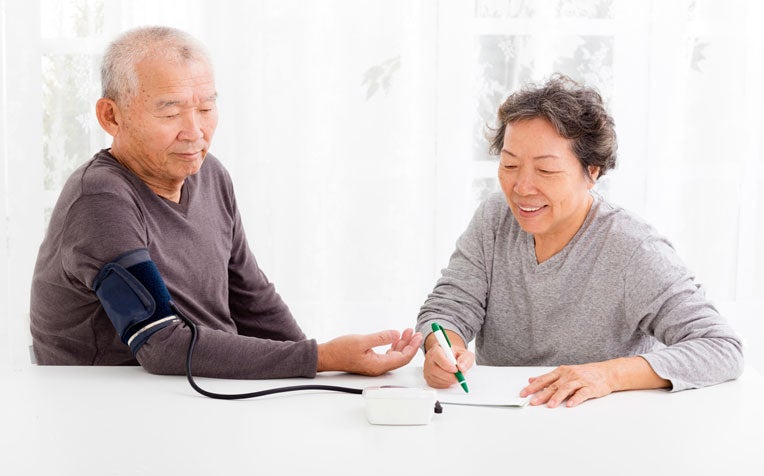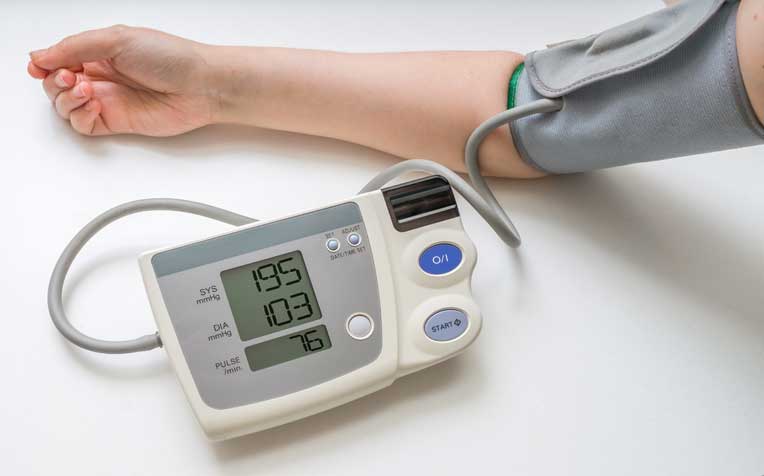
Resistant high blood pressure can now be controlled and has a procedure to manage it.
Madam Malia D., 71, just could not get her blood pressure down – not even after taking six different medicines for high blood pressure every day.
Sometimes, her systolic blood pressure would be so high that her home monitoring system would go haywire, displaying an error message instead of a reading.
For more than six months, her systolic pressure hovered between 200 and 210 millimetres of mercury (mmHg) – well above the accepted 140 mmHg for someone her age.
Her daughter Madam Yusminah Y., 55, a trained nurse, thought her mother was, perhaps, not taking her pills correctly from the pillbox. So, she changed the way she packed them, using little plastic bags and labels in Malay. But faultless pill popping did not improve Mdm Malia’s condition.
No response to high blood pressure treatment
What she had was resistant hypertension. It is a form of high blood pressure that does not respond to treatment, even one that consisted of a combination of at least three drugs.
Mdm Malia’s condition made her constantly breathless.
“Previously, she used to go down to the park for seniors. But as the breathlessness got worse, she couldn’t. She would become breathless even while talking or lying down,” said Mdm Yusminah.
She knew only too well that persistent hypertension would put her mother at risk of stroke and heart disease, but there seemed little she could do.
Then, in January this year, Mdm Malia underwent renal denervation at National Heart Centre Singapore (NHCS). The new minimally invasive procedure uses radiofrequency waves to destroy parts of the sympathetic nerves surrounding the renal arteries. It dramatically brought her blood pressure down to the target level.
“The doctors said the effects would be noticeable within a week, but my mother’s blood pressure dropped the very same day. The best part is she’s no longer breathless,” said Mdm Yusminah.
High blood pressure, known as “the silent killer”, can remain unnoticed for many years, and is sometimes only discovered when the disease progresses and patients develop potentially fatal complications, such as strokes or heart attacks. However, some patients may have symptoms like headaches, shortness of breath and dizziness.
Resistant to medication
Dr Jack Tan Wei Chieh, Deputy Head and Senior Consultant, Department of Cardiology, National Heart Centre Singapore (NHCS), a member of the SingHealth group, said that in the resistant variety, although patients take their medication as instructed, their blood pressure remains high.
“About a fifth of the adult population above the age of 60 currently has hypertension and, among them, three to five per cent are likely to have the resistant form. With the nation’s rapidly ageing population, the proportion of adults with hypertension will increase, bringing with it a rising trend of resistant cases,” he added.
In some patients, resistant hypertension may be caused by some identifiable condition such as hormone imbalance, kidney failure or blocked kidney arteries. In others, like Mdm Malia, there is no known cause. What is known is that it is aggravated in individuals who are older, obese or diabetic.
Previously, these patients had no other option. Despite changes in diet, lifestyle and medication, they were unable to lower their blood pressure.
For them, renal denervation is a breakthrough. The renal sympathetic nerves contain both afferent and efferent nerves that send signals to the brain, which responds accordingly. For instance, the brain may send signals back to the kidney (through the renal nerves) for the arteries to constrict and retain more salt and water, hence, increasing blood pressure. The kidney also sends signals back to the brain which, in turn, signals the heart to beat faster when stressed, thus affecting blood pressure.
“This channel runs amok in disease states such as resistant hypertension. The brain and kidney perpetually send excessive amounts of signals to each other, not just during stress or dehydration, but even in restful states. So, by selectively disabling certain sections of these sympathetic nerves that surround the renal arteries, renal denervation helps to decrease these excessive signals, which in turn decreases blood pressure,” said Dr Tan.
A safe procedure
The minimally invasive technology has been carried out overseas for two years, and has been shown to be effective and durable.
Although renal denervation will not cure high blood pressure, it is able to reduce the blood pressure by an average of 32/12 mmHg. All three patients, who have had the procedure done at NHCS since September last year, have achieved more than 20 mmHg reductions in their blood pressure. Even a small 5 mmHg reduction in blood pressure can bring down the risk of stroke by 14 per cent, heart disease by nine per cent and death by seven per cent.
How is she doing now?
Mdm Malia’s blood pressure is now at an acceptable level of 140/90 mmHg, and she now takes a smaller dosage of medicines. With further monitoring, doctors will probably reduce the number of drugs too.
“She hasn’t started going to the exercise park, but is definitely happier. All my mother’s siblings had high blood pressure and have passed away, some even before they reached 50. None of them had the option of this new procedure. I’m just glad my mother did,” said Mdm Yusminah.
Ref: T12
Contributed by


















 Get it on Google Play
Get it on Google Play